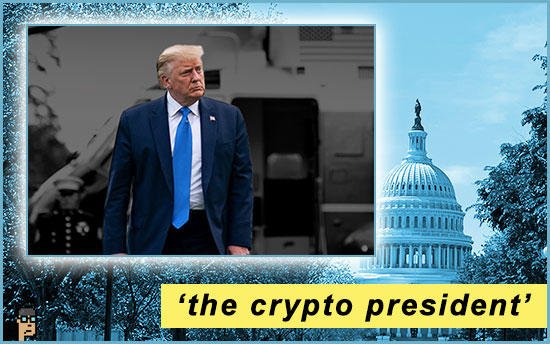crypto president
A San Francisco-based tech executive, Trevor Traina, spills some tea on the big fundraiser (led by David Sacks and Chamath Palihapitiya) last week for former President Donald Trump which raised $12 million. At the event, Trump said “he would be the crypto president,” according to Traina.
As part of the story, Reuters was able to get the first statement attributed to a White House official by name since … maybe… the Executive Order in March 2022: “The White House under [President Joe] Biden has also said that it is eager to work with Congress to develop a regulatory framework for cryptocurrencies. In a statement to Reuters, White House spokesperson Robyn Patterson said the Biden administration had supported innovation in digital assets while seeking to protect consumers from ‘risks associated with new technologies.'” Read more.
more tips:
-
- Why Trump is finding new friends in Silicon Valley (June 7) – Politico
- ‘It’s Not 2016 Anymore’: Trump Finds Friends in Silicon Valley (June 6) – The New York Times
what you should know: Patterson is maintaining the White House’s new, parallel narrative that its supportive of digital assets (as it mentioned in the veto of SAB 121 and the FIT 21 guidance). Meanwhile, proof is in the pudding. White House proxies such as Dem leadership on the House Financial Services Committee have not changed their skeptical, combative views as exhibited during last month’s FIT 21 floor debate and last week’s tokenization hearing.
Senate rumblings
Punchbowl News’ Brendan Pedersen takes an informal poll of Senate members regarding crypto legislation and finds little room on the schedule for (or interest in) a digital assets market structure bill in the current Congress. Among those polled, Senate Banking Chair Sherrod Brown (D, OH) gives his stock answer that he won’ t negotiate through the media.
Meanwhile, Sen. Jack Reid (D, OH) takes a page from the House’s market structure deliberations between House Agriculture and House Financial Services (e.g. see last May’s hearing) and tells Pedersen that Senate Banking and Senate Ag need to coordinate. Reid says, “For a serious effort, both committees should [be involved]. The hope would be that there would be consistency, that there wouldn’t be legislation that presented arbitrage of agency supervision.” Read more in Punchbowl News’ The Vault newsletter (subscription).
Sen. Warner’s sanctions bill
Last week’s news that Senator Mark Warner (D, VA) has added his Terrorist Financing Prevention Act [S.3441] into “Section 423” of a Senate Intelligence must-pass gets a thorough review from Cap Hill Crypto’s George Leonardo in his Friday newsletter.
The broad scope of the bill and its inclusion already has some decentralized finance advocates worried.
Leonardo goes deep into the details and concludes, “pro-crypto House Republicans, like Republican Whip Tom Emmer (R, MN) and HFSC Chair Patrick McHenry (R, NC), would likely oppose Section 423’s inclusion in any bill that might become law.”
Read all about it from Cap Hill Crypto.
Gruenberg this week
Will he or won’t he? The current, embattled FDIC Chair Martin Gruenberg willingness to testify at this Wednesday’s House Financial Services Committee hearing on the agency’s sexual harassment scandal remains in question.
The Chairman – reviled in crypto circles for the perception of a Choke Point 2.0 strategy – is currently leaning against it, says Punchbowl News.
The hearing currently has 4 witnesses including current Office of the Comptroller of the Currency Acting Comptroller Michael Hsu.
See the Committee memorandum (PDF).
next Congress for crypto
In an interview in Semafor published last week, House Majority Whip Tom Emmer (R, MN) makes clear that the next Congress will see the “sea change” of new law related to bringing digital assets under the U.S. financial system’s umbrellas. Whip Emmer says, “I think people are going to recognize after this election is over, that the time has come… And under the next administration, I think you’ll see some actual crypto-friendly, stablecoin-friendly, digital asset-friendly laws being put on the books.”
The article emphasizes that Republicans are in a good position to “win over” 18-40 year-old voters given Democratic leadership’s stance in the current Congress. Read more.
see it now
Photo: SEC Chair Gary Gensler with original documents of the 1934 Securities Exchange Act – SEC via Capitol Account
EU over-regulates again
On Friday, policy executive Seth Hertlein of Paris-based Ledger, bemoaned the announced acquisition of European cryptocurrency exchange Bitstamp by Robinhood in a lengthy tweet on X.
Hertlein sees the sale as another example of overreaching European Union regulation (i.e. Markets in Crypto-Assets or MiCA) which fails to support European entrepreneurship. He tweeted in part, “MiCA was heralded by the EU institutions (and much of the crypto industry) as ensuring that Europe ‘wouldn’t lose Web3 the way it lost Web2.’ That line, in particular, was quoted ad nauseum. Except, MiCA (together with the constellation of regulations the EU continues to erect around it) guarantees just the opposite, as I have been saying for some time.” Read more.
more tips:
-
- Crypto Remains Sidelined as EU Election Kicks Off (June 6) – CoinDesk
what you should know: Another way to look at it is: a U.S. company is trying to execute a successful digital assets strategy that will serve the company even if the United States is unable to create a domestic, digital assets regulatory framework… i.e. Robinhood is going overseas.
still more tips
Elizabeth Warren Ditches Consumer Welfare In Support of Big Banks – Real Clear Markets
Are US legislators warming to crypto? The SEC approves Ethereum ETPs, and a crypto bill gets through the House. – Molly White
Crypto Marketplace Bakkt Weighs Potential Sale, Breakup – Bloomberg
Franklin Templeton Enables USDC Conversions on Benji Investments Platform – Franklin Templeton
New York AG sues promoters of two crypto schemes over $1 billion in alleged losses – The Block

